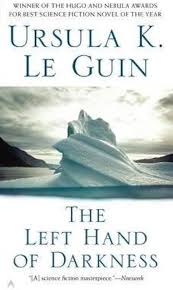
- Publisher: Ace Science Fiction
- Published Date: 2010
- Original Publish Date: 1969
- Pages: 330
- ISBN: 978-0-441-47812-5
- Author: Ursula Le Guin
The Left Hand of Darkness by Ursula K. Le Guin is the ground breaking novel that questioned some of our preconceptions about gender, sexuality and gender identity as well as the effects on society of our ‘normal’ human patterns. It is a first contact novel and a political novel and an adventure story.
In some far future of Le Guin’s Hainish universe, humanity has reached out to multiple star systems across the galaxy and most of them have lost contact, and even knowledge of, each other and of their origin. The Ekumen is a loose confederation of some of these planets that is reaching out and trying to reunite humanity.
Genly Ai is a Terran representative of the Ekumen sent to the planet Gethen (or Winter) to be the first contact with this alternative human world. On Gethen, perhaps due to genetic manipulation eons ago, the people are genderless most of the time, and only during a monthly cycle of “kemmer” do they take on sexual desires and physical gender attributes. These are not fixed and a single person may take on male attributes one month and female in another. They can both father children or bear children at different times.
With no fixed gender and no sexual desires for most of the time, a different sort of society has grown on Gethen. Much of the book is about how Genly Ai and his main counterpart, Estraven, do not really understand each other. The society on Gethen is close enough to ‘normal’ humanity, that the Terran does not even realize he is misunderstanding the political and personal interactions. Similarly, the Gethen does not understand how badly he is misunderstood. This exploration of gender and sexuality and its possible effects on a society is thought provoking.
Le Guin uses ‘he/him’ pronouns for the inhabitants of Gethen throughout the novel. In 1969, the masculine pronouns were generally accepted to represent all humanity as well as male humanity. I couldn’t help but wonder if she had used ‘they/them’ pronouns how it would have modified the reader’s understanding of the culture and Genly’s approach to the culture. I think it would have made the ambisexual nature of the Gethenites and their society more easily understood, but perhaps it would not have highlighted the contrast with the Ekumen/Terrans as much.
The Left Hand of Darkness was a groundbreaking novel in 1969. Perhaps it is even more important today to think about how our gender ideas are baked into our society. To think about those things that we don’t even think to think about. We need to realize that just because something makes sense to us, it does not mean we really understand it. It is OK to not always understand, and it is OK to realize this and still accept what we can’t yet fully understand.
_________________
Another science fiction story with a non-binary main character…
Plastivore by Matt Truxaw











